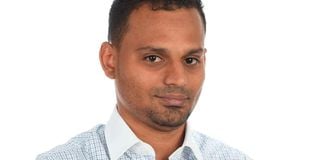Once labelled a failure, he is now helping startups achieve success

What you need to know:
- I observed a gap that exists in many companies, particularly small and medium-sized enterprises.
- Many entrepreneurs are unaware of the mistakes they are making, and I also observed that most business consultants concentrate on a single area, such as accounting, finance, marketing, or human resources, but none can take on a business and assist it in every department.
He was once labeled a failure, but 36-year-old doctor Mohamed Bahaidar is now assisting SMEs and young people achieve greatness.
While growing up, he was teased by classmates for having poor comprehension skills and was often termed an underachiever. But, he has since overcome his insecurities and gained greater self-awareness.
Dr Mohammed is the CEO of IQRA FM. He is also a prolific motivational speaker, business consultant, media personality, and author of five inspirational books.
He holds a Bachelor’s degree in business administration, a Master’s degree in the same field and a Doctor of Philosophy in Management (PhD) from the University of Newcastle.
What was your dream career?
I have always had big dreams, even though I was labelled an underachiever. I overcame the stigma and went on to achieve my life's ambitions. I've always wanted to be an ambassador, and I think I have strong problem-solving and financial skills.
I was always very good in communication, but I took too many risks that resulted in failed startups, like the restaurant I once owned in Malaysia. Nevertheless, I learnt from my mistakes.
I observed a gap that exists in many companies, particularly small and medium-sized enterprises. Many entrepreneurs are unaware of the mistakes they are making, and I also observed that most business consultants concentrate on a single area, such as accounting, finance, marketing, or human resources, but none can take on a business and assist it in every department.
This brings us to the third aspect, marketing. We tend to get so caught up in our daily marketing routine that we forget about all of the other marketing channels that are available, and how to think creatively. Marketing is all about innovation, identifying gaps, and figuring out how to break into the market.
Understanding your customer base and doing market research is even more important than establishing the business.
But how exactly did you discover your knack for helping small businesses grow?
As I’ve mentioned, I once owned a restaurant in Malaysia, which became a failed project. Aside from that, I was once employed at Debenhams Stores in Qatar, where I became proficient at reviving enterprises that were about to fail.
What is your role at IQRA FM?
As the CEO, my first assignment was to modernise the Islamic Radio Station and establish it as one of Kenya's most prominent and effective media outlets. I embarked on rebranding and relaunching the station with quality shows and content. I led the mission to inform, entertain, captivate, and educate youth, adults, and the general public. My focus is on mentorship, growth, and promoting Islamic values, ideas, talents, and businesses to our dynamic and expanding our audience.
Which of your projects would you single out as the most successful?
Aside from my success at IQRA FM, my biggest accomplishment was the consulting work I did in Zanzibar in 2013. In its water vending operation, the company was having trouble staying afloat. We successfully increased sales from 67,000 to 97,000 packages and decreased diesel theft from 6.5 million to 3.5 million Tanzanian shillings.
We launched a marketing campaign unlike anything they had done before, adding a progressive element with things like business cards, posters and uniforms. For this, I was awarded the most distinguished award in the Middle East, North Africa, and Asia for introducing pragmatic solutions to business and social issues in Muscat, Oman, in 2019.
What are your unique qualities?
My ability to face my shortcomings head-on and my capacity for persuasion are my strengths. I am a realistically optimistic person, and I tend to see opportunities when others do not. I enjoy interacting with people, and I give inspirational speeches on a variety of platforms. I put in a lot of effort to reach my goals since I think the world is moving a little slowly and we have a lot to accomplish in a limited amount of time
What is it that motivates you?
My main driving force is getting good results. When I see the results of my work, I get excited and feel fulfilled. I dedicate everything I have—my time, money, energy—to whatever I am focusing on because I don't think failure is an option for me.
What scares you the most?
My biggest worry is not living up to my potential and disappointing myself and others. I have no idea how to handle failure. This, in my opinion, has its roots in my early years, when I was perceived by others as naive and incapable of succeeding in life due to my weird behaviour. I was determined to prove that society can’t dictate my fate. I turned my anxieties into stepping stones to success.
Who is your role model?
I draw inspiration from Umar Ibn Abdulaziz, a mentor and one of the best administrators in history. He oversaw and controlled over 22 states while ensuring that poverty was eradicated to the point that charity donations had no place, since there were no longer any impoverished people living under his regime.
What are your future aspirations?
My original desire to be an ambassador endures.




